

Count On It - What’s Going On with Lower Sperm Counts?
Homeopathy Explained – Gentle Healing or Reckless Fraud? Martial Arts. Sanitation. Quit Smoking. Family Planning. 26 Scientifically Proven Superhuman Benefits of Meditation. I have a confession to make… I know meditation is meant to be good for you but I don’t meditate every day.
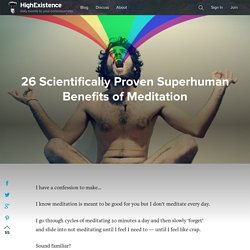
I go through cycles of meditating 20 minutes a day and then slowly ‘forget’ and slide into not meditating until I feel I need to — until I feel like crap. Sound familiar? But recently things have been different. For the last 30 days I’ve meditated for 25 minutes in the morning, 25 minutes in the evening and taken multiple 5 minute mindfulness breaks throughout the day. I’ve written posts on the myths of motivation in the past going into the science of what makes people tick, but what I didn’t mention is what I believe the ultimate motivator is: reasons to act. Simple I know, but when you have enough reasons to do something, motivating yourself to do it becomes a non-issue — this is why I tell everyone to read a book on a habit they want to change. Bombarding your brain with reasons to act makes motivation easy. I didn’t eat any vegetables until I was 20.
Want to give up smoking? 1. 2. 3. Sense & Sustainability. THAILAND: Throwing mud at flood water. Mud balls may be another option in cleaning up water BANGKOK, 17 November 2011 (IRIN) - Thousands of Thais - with noses pinched and fingers crossed - are tossing mud balls into fetid flood water, in the hope of improving the quality of stagnant water following weeks of flooding.
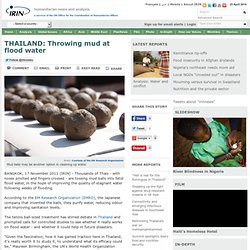
According to the EM Research Organization (EMRO), the Japanese company that invented the balls, they purify water, reducing odour and improving sanitation levels. The tennis ball-sized treatment has stirred debate in Thailand and prompted calls for controlled studies to see whether it really works on flood water - and whether it could help in future disasters. "Given the fascination, how it has gained traction here in Thailand, it's really worth it to study it, to understand what its efficacy could be," Maureen Birmingham, the UN's World Health Organization (WHO) representative to Thailand and acting resident coordinator for the UN system, told IRIN. Salud alternativa. Is volunteering a public health intervention? A systematic review and meta-analysis of the health and survival of volunteers. Research article Caroline E Jenkinson1, Andy P Dickens2, Kerry Jones3, Jo Thompson-Coon3, Rod S Taylor1, Morwenna Rogers3, Clare L Bambra4, Iain Lang3 and Suzanne H Richards1* * Corresponding author: Suzanne H Richards s.h.richards@exeter.ac.uk Author Affiliations 1 Primary Care, University of Exeter Medical School, Smeall Building, St Luke’s Campus, Exeter EX1 2LU, UK 2 Public Health, Epidemiology and Biostatistics, School of Health and Population Sciences, University of Birmingham, Edgbaston, Birmingham B15 2TT, UK.
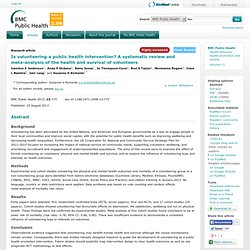
Who Pays the Price? The Human Cost of Electronics. Vitality for People and the Planet. Health: Safer chemicals, cleaner air. HIV: New facts and stunning data visuals. Update: Use the HIV presentation material in your own lecture – Download here.
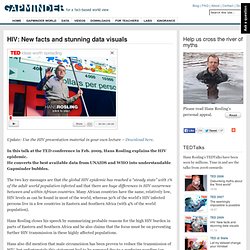
In this talk at the TED conference in Feb. 2009, Hans Rosling explains the HIV epidemic.He converts the best available data from UNAIDS and WHO into understandable Gapminder bubbles. The two key messages are that the global HIV epidemic has reached a “steady state” with 1% of the adult world population infected and that there are huge differences in HIV occurrence between and within African countries. Many African countries have the same, relatively low, HIV levels as can be found in most of the world, whereas 50% of the world’s HIV infected persons live in a few countries in Eastern and Southern Africa (with 4% of the world population).
Hans Rosling closes his speech by summarizing probable reasons for the high HIV burden in parts of Eastern and Southern Africa and he also claims that the focus must be on preventing further HIV transmission in these highly affected populations. The River of Myths by Hans Rosling. Silent Spring Institute. The Contenders. Heart Stop Beating. Health. Contact | Newsletter | Français Menu Close Sign up for our newsletter and get the latest environmental news and green-living tips in your inbox.
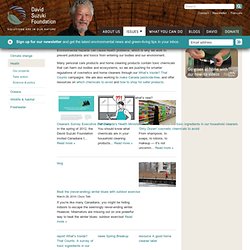
Issues » Health Issues Health Environmental hazards can cause health problems, which is why we work to prevent pollutants and toxics from entering our bodies and our environment. Many personal care products and home cleaning products contain toxic chemicals that can harm our bodies and ecosystems, so we are pushing for smarter regulations of cosmetics and home cleaners through our What's Inside? What's new? Cleaners Survey Executive Summary In the spring of 2012, the David Suzuki Foundation invited Canadians t... Tell Canada's Health Minister to come clean about the toxic ingredients in our household cleaners You should know what chemicals are in your household cleaning products... 'Dirty Dozen' cosmetic chemicals to avoid. How Trees Calm Us Down. In 1984, a researcher named Roger Ulrich noticed a curious pattern among patients who were recovering from gallbladder surgery at a suburban hospital in Pennsylvania.
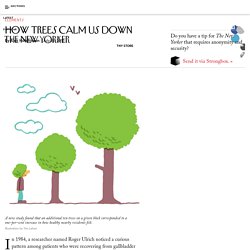
Those who had been given rooms overlooking a small stand of deciduous trees were being discharged almost a day sooner, on average, than those in otherwise identical rooms whose windows faced a wall. The results seemed at once obvious—of course a leafy tableau is more therapeutic than a drab brick wall—and puzzling. Whatever curative property the trees possessed, how were they casting it through a pane of glass? That is the riddle that underlies a new study in the journal Scientific Reports by a team of researchers in the United States, Canada, and Australia, led by the University of Chicago psychology professor Marc Berman.
Are such numbers fanciful?